Nato summit: PM says military action against IS 'not ruled out'
Nato leaders will discuss Ukraine and the rise of the Islamic State – but what will the summit achieve?
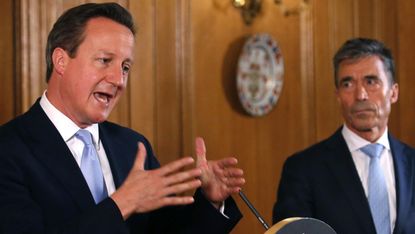
Nato leaders are convening in Wales today, and before the summit even officially begins the diplomacy has started in earnest.
David Cameron has said he will not rule out military action against Islamic State militants, who have killed two American journalists in recent weeks and are threatening to kill a Scottish aid worker.
In a BBC interview, Cameron said that if Britain was to join the US in launching airstrikes against IS its actions would have to be "properly thought through and patiently delivered", without going "over the heads of neighbouring states".
Subscribe to The Week
Escape your echo chamber. Get the facts behind the news, plus analysis from multiple perspectives.

Sign up for The Week's Free Newsletters
From our morning news briefing to a weekly Good News Newsletter, get the best of The Week delivered directly to your inbox.
From our morning news briefing to a weekly Good News Newsletter, get the best of The Week delivered directly to your inbox.
He also ruled out paying a ransom to secure the hostage's release.
As well as the threat posed by IS militants abroad and at home, the Nato summit will also discuss the ongoing crisis in Ukraine.
In a mark of the seriousness with which the alliance views its deteriorating relationship with Russia, Ukrainian President Petro Poroshenko has been invited to brief world leaders on discussions he has had with Vladimir Putin.
According to The Times, "Russia will dominate the summit in Newport today", as leaders discuss how to address Moscow's suspected intervention in eastern Ukraine.
Nato summit: what will it achieve?
World leaders will gather in Wales this week for the first Nato summit since Chicago in 2012, and the first in the UK since Margaret Thatcher was the host in London in 1990.
Top of the agenda will be the growing instability in Ukraine and the future of Nato's engagement in Afghanistan. The summit will provide both challenges and opportunities for Wales.
Where will it be held and who is going?
It's taking place at Newport's Celtic Manor Resort, which hosted the 2010 Ryder Cup golf tournament, on 4 and 5 September. Some 150 heads of state and ministers will attend, including Barack Obama, Angela Merkel and Francois Hollande. The leaders' combined entourage will comprise around 10,000 support staff.
What will be discussed?
Top of the agenda will be the continuing tensions in Ukraine. That crisis could make this summit the most important Nato gathering since Prague in 2002, when Nato added seven members.
According to the Washington Post, by invading Ukraine just one week before the summit, Vladimir Putin effectively taunted Nato, which he believes lacks the will to challenge him on the matter.
However, Nato secretary general Anders Fogh Rasmussen told The Guardian the summit will overcome divisions within the alliance and agree to new deployments on Russia's borders. He hopes members will agree a "readiness action plan" over Ukraine.
What else?
Also on the agenda will be growing threats to Nato countries from Islamic State, rogue and fragile states, piracy, terrorism and cyber attacks. Nato says other topics to be discussed include "collective defence", military spending, deepening partnerships and the future of Nato's engagement in Afghanistan.
What does the summit mean for Wales?
A security headache, primarily. The summit will be the largest gathering of international leaders ever to take place in Britain. With various protests planned and terror threats expected, some 9,500 police officers drawn from 43 UK police forces will work in and around the site. Additionally, 12 miles of security fencing has been installed at keys sites in Cardiff and in Newport.
First Minister Carwyn Jones says the summit will be a "momentous occasion in the history of Wales" and a chance to boost business and tourism. David Cameron added: "We had the G8 in Northern Ireland, we had the Olympics in London, we've got the Commonwealth Games in Scotland - it is Wales' turn for one of these big events."
Nato summit: Obama and Cameron to demand more defence spending
1 September
At a Nato summit in Wales this week, Barack Obama and David Cameron will call on all members of the alliance to increase their defence budgets in line with commitments to maintain an expenditure of at least two per cent of their total GDP on their armed forces.
British military chiefs backed the call, accusing some states of "freeloading" on members who are fulfilling their obligations, including the US and the UK, the Daily Telegraph says. But some diplomats are expected to reject the criticism, arguing that the spending targets are "arbitrary".
Former senior military commanders also called on all members to meet their obligations. Sir Alan West, a former head of the Navy, said: "People in a number of countries have been willing to get a free ride and are not spending. If you look at Europe, it's only France and the UK who meet the target. Nato has to realise that it's no good having a broken force".
Sir Richard Dannatt, a former Army chief, said many European states needed to improve their current military capabilities. He said: "The sad fact is that with the exception of a small number of European Nato member states — which include the UK and France principally — the vast majority of the armed forces of other European states lack real usable capability and their governments often lack the political will to fund their armed forces properly."
Nato members attending the two-day summit in Newport are expected to debate how to respond to recent developments in Ukraine and Iraq.
But Xenia Wickett, the head of the USA program at Chatham House, told journalists that the Wales summit needs to be a "way station" rather than an "endpoint" in dealing with the complex global security situations the alliance is facing, USA Today reports.
"There's a risk that the summit becomes all about putting out fires rather than a more strategic one," she said. "The summit needs to pay attention to current events, but it also needs to look much further ahead in terms of where Nato as an organisation is going."
Create an account with the same email registered to your subscription to unlock access.
Sign up for Today's Best Articles in your inbox
A free daily email with the biggest news stories of the day – and the best features from TheWeek.com
-
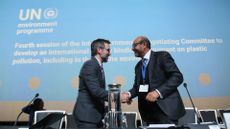 Ottawa climate talks: can global plastic problem be solved?
Ottawa climate talks: can global plastic problem be solved?In the spotlight Nations aim to draft world's first treaty on plastic pollution, but resistance from oil- and gas-producing countries could limit scope
By Harriet Marsden, The Week UK Published
-
 Netherlands split on WFH for sex workers
Netherlands split on WFH for sex workersSpeed Read Councils concerned over 'nuisance' of at-home sex work, but others say changes will curb underground sex trade
By Arion McNicoll, The Week UK Published
-
 'He adored Trump, and then rejected him'
'He adored Trump, and then rejected him'Today's Newspapers A roundup of the headlines from the US front pages
By The Week Staff Published
-
 How would we know if World War Three had started?
How would we know if World War Three had started?Today's Big Question With conflicts in Ukraine, Middle East, Africa and Asia-Pacific, the 'spark' that could ignite all-out war 'already exists'
By Harriet Marsden, The Week UK Published
-
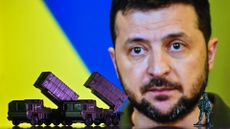 Will Iran attack hinder support for Ukraine?
Will Iran attack hinder support for Ukraine?Today's Big Question Pro-Kyiv allies cry 'hypocrisy' and 'double standards' even as the US readies new support package
By Elliott Goat, The Week UK Published
-
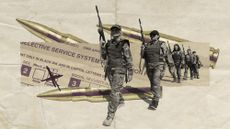 The issue of women and conscription
The issue of women and conscriptionUnder the radar Ukraine military adviser hints at widening draft to women, as other countries weigh defence options amid global insecurity
By Harriet Marsden, The Week UK Published
-
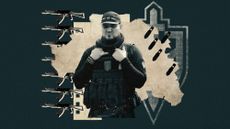 Why is Ukraine backing far-right militias in Russia?
Why is Ukraine backing far-right militias in Russia?Today's Big Question The role of the fighters is a 'double-edged sword' for Kyiv, say commentators
By The Week UK Published
-
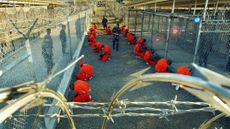 A history of Guantánamo Bay
A history of Guantánamo BayThe Explainer War of Terror's 'symbol of torture, rendition and indefinite detention' is subject of new Serial podcast series
By The Week UK Published
-
 Why is Islamic State targeting Russia?
Why is Islamic State targeting Russia?Today's Big Question Islamist terror group's attack on 'soft target' in Moscow was driven in part by 'opportunity and personnel'
By Elliott Goat, The Week UK Published
-
 Ukraine's unconventional approach to reconstruction
Ukraine's unconventional approach to reconstructionUnder the radar Digitally savvy nation uses popular app to file compensation claims, access funds and rebuild destroyed homes
By Harriet Marsden, The Week UK Published
-
 What does victory now look like for Ukraine?
What does victory now look like for Ukraine?Today's Big Question Not losing is as important as winning as the tide turns in Russia's favour again
By Elliott Goat, The Week UK Published